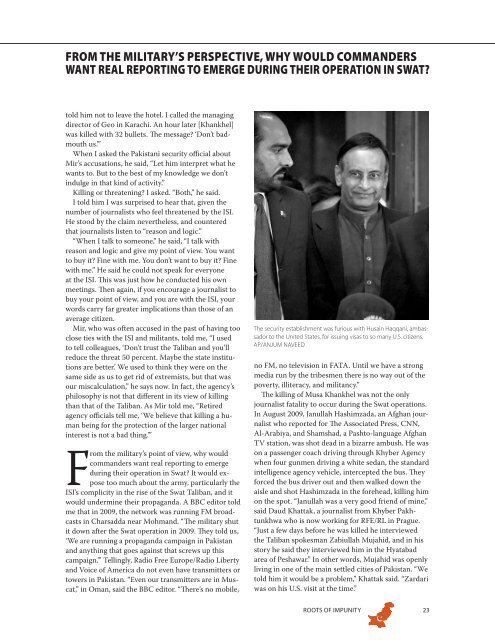CPJ.Pakistan.Roots.of.Impunity
CPJ.Pakistan.Roots.of.Impunity
CPJ.Pakistan.Roots.of.Impunity
You also want an ePaper? Increase the reach of your titles
YUMPU automatically turns print PDFs into web optimized ePapers that Google loves.
FROM THE MILITARY’S PERSPECTIVE, WHY WOULD COMMANDERS<br />
WANT REAL REPORTING TO EMERGE DURING THEIR OPERATION IN SWAT?<br />
told him not to leave the hotel. I called the managing<br />
director <strong>of</strong> Geo in Karachi. An hour later [Khankhel]<br />
was killed with 32 bullets. The message? ‘Don’t badmouth<br />
us.’”<br />
When I asked the <strong>Pakistan</strong>i security <strong>of</strong>ficial about<br />
Mir’s accusations, he said, “Let him interpret what he<br />
wants to. But to the best <strong>of</strong> my knowledge we don’t<br />
indulge in that kind <strong>of</strong> activity.”<br />
Killing or threatening? I asked. “Both,” he said.<br />
I told him I was surprised to hear that, given the<br />
number <strong>of</strong> journalists who feel threatened by the ISI.<br />
He stood by the claim nevertheless, and countered<br />
that journalists listen to “reason and logic.”<br />
“When I talk to someone,” he said, “I talk with<br />
reason and logic and give my point <strong>of</strong> view. You want<br />
to buy it? Fine with me. You don’t want to buy it? Fine<br />
with me.” He said he could not speak for everyone<br />
at the ISI. This was just how he conducted his own<br />
meetings. Then again, if you encourage a journalist to<br />
buy your point <strong>of</strong> view, and you are with the ISI, your<br />
words carry far greater implications than those <strong>of</strong> an<br />
average citizen.<br />
Mir, who was <strong>of</strong>ten accused in the past <strong>of</strong> having too<br />
close ties with the ISI and militants, told me, “I used<br />
to tell colleagues, ‘Don’t trust the Taliban and you’ll<br />
reduce the threat 50 percent. Maybe the state institutions<br />
are better.’ We used to think they were on the<br />
same side as us to get rid <strong>of</strong> extremists, but that was<br />
our miscalculation,” he says now. In fact, the agency’s<br />
philosophy is not that different in its view <strong>of</strong> killing<br />
than that <strong>of</strong> the Taliban. As Mir told me, “Retired<br />
agency <strong>of</strong>ficials tell me, ‘We believe that killing a human<br />
being for the protection <strong>of</strong> the larger national<br />
interest is not a bad thing.’”<br />
From the military’s point <strong>of</strong> view, why would<br />
commanders want real reporting to emerge<br />
during their operation in Swat? It would expose<br />
too much about the army, particularly the<br />
ISI’s complicity in the rise <strong>of</strong> the Swat Taliban, and it<br />
would undermine their propaganda. A BBC editor told<br />
me that in 2009, the network was running FM broadcasts<br />
in Charsadda near Mohmand. “The military shut<br />
it down after the Swat operation in 2009. They told us,<br />
‘We are running a propaganda campaign in <strong>Pakistan</strong><br />
and anything that goes against that screws up this<br />
campaign.’” Tellingly, Radio Free Europe/Radio Liberty<br />
and Voice <strong>of</strong> America do not even have transmitters or<br />
towers in <strong>Pakistan</strong>. “Even our transmitters are in Muscat,”<br />
in Oman, said the BBC editor. “There’s no mobile,<br />
The security establishment was furious with Husain Haqqani, ambassador<br />
to the United States, for issuing visas to so many U.S. citizens.<br />
AP/ANJUM NAVEED<br />
no FM, no television in FATA. Until we have a strong<br />
media run by the tribesmen there is no way out <strong>of</strong> the<br />
poverty, illiteracy, and militancy.”<br />
The killing <strong>of</strong> Musa Khankhel was not the only<br />
journalist fatality to occur during the Swat operations.<br />
In August 2009, Janullah Hashimzada, an Afghan journalist<br />
who reported for The Associated Press, CNN,<br />
Al-Arabiya, and Shamshad, a Pashto-language Afghan<br />
TV station, was shot dead in a bizarre ambush. He was<br />
on a passenger coach driving through Khyber Agency<br />
when four gunmen driving a white sedan, the standard<br />
intelligence agency vehicle, intercepted the bus. They<br />
forced the bus driver out and then walked down the<br />
aisle and shot Hashimzada in the forehead, killing him<br />
on the spot. “Janullah was a very good friend <strong>of</strong> mine,”<br />
said Daud Khattak, a journalist from Khyber Pakhtunkhwa<br />
who is now working for RFE/RL in Prague.<br />
“Just a few days before he was killed he interviewed<br />
the Taliban spokesman Zabiullah Mujahid, and in his<br />
story he said they interviewed him in the Hyatabad<br />
area <strong>of</strong> Peshawar.” In other words, Mujahid was openly<br />
living in one <strong>of</strong> the main settled cities <strong>of</strong> <strong>Pakistan</strong>. “We<br />
told him it would be a problem,” Khattak said. “Zardari<br />
was on his U.S. visit at the time.”<br />
ROOTS OF IMPUNITY 23


